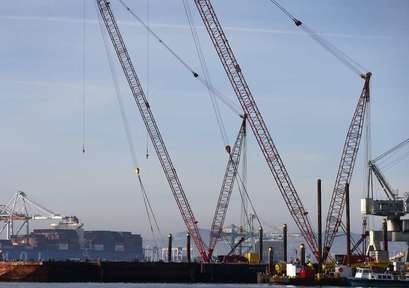Oakland, terminal building go to court Tuesday over city’s coal ban  Photo: Paul Chinn, The Chronicle - Cranes are docked near the site of a proposed coal storage and shipping facility at the Port of Oakland on Saturday, Jan. 13, 2018. Photo: Paul Chinn, The Chronicle - Cranes are docked near the site of a proposed coal storage and shipping facility at the Port of Oakland on Saturday, Jan. 13, 2018. The company that wants to transport coal by rail to the Port of Oakland for overseas shipment says the city’s ban on coal-handling violates the Constitution, federal law and common sense. The city says it agreed to let the company build a $250 million shipping terminal after the firm’s officials falsely denied the sight would be used for coal storage and shipments. Most Popular The two sides also disagree on greenhouse gases and pollution controls. But the trial that begins Tuesday in federal court in San Francisco will most likely come down to a single question: whether Oakland, when it outlawed coal-handling and storage within its borders in July 2016, had reasons to conclude that the substance was a health hazard. Oakland's coal fight
“The City Council has to have substantial evidence that there’s a substantial danger,” U.S. District Judge Vince Chhabria, who will conduct the nonjury trial, said at a pretrial hearing last week. Oakland doesn’t need airtight proof, just enough evidence of potential health risks to support its ban, Chhabria told a lawyer for Oakland Bulk and Oversized Terminal, the shipping company known as OBOT and controlled by developer Phil Tagami. But the judge also told the city’s lawyer, “You have to show a substantial danger.” The city says the primary danger comes from coal-dust emissions in a low-income neighborhood already suffering from air pollution and high rates of illnesses such as asthma. The company says it can minimize emissions with rail-car covers and other safety measures, and also contests the city’s warnings of potentially disastrous explosions and fires. Tagami is a longtime friend of Gov. Jerry Brown and owns the seven-story building near Oakland City Hall where Brown and his wife, Anne Gust Brown, were married in 2005. As mayor of Oakland, Brown appointed Tagami to positions on the Oakland Port Commission and, as governor, appointed him to the state medical board. But the governor has also praised the city’s 2016 ordinance and said California should “eliminate the shipment of coal” through its ports. Tagami’s project would move coal from Utah by rail to the terminal his company would build on city-owned land in West Oakland, at the site of a former Army base, and from there to ships for export. In a court filing, city lawyers said Tagami had secretly discussed coal with potential partners on the project since 2011, but told city officials in 2013, shortly after signing the terminal contract, that his company had “no interest or involvement in the pursuit of coal-related operations.” As late as September 2015, the city said, the company’s formal design plan said the facility would handle “Commodity A,” which later turned out to be coal. But the company says it was Oakland that acted deceptively in passing the 2016 ordinance. The City Council showed its hand in June 2014 by unanimously adopting a resolution opposing coal shipments through Oakland, lawyers for OBOT said in court filings. As council members posted “No Coal in Oakland” signs on social media, and Mayor Libby Schaaf told Tagami in a May 2015 letter that “we will not have coal shipped through our city,” the council commissioned dubious studies to support its preordained decision to ban the shipments, the lawyers said. The city ignored evidence of the safe handling of coal at terminals in Long Beach and Pittsburg, and brushed off recommendations by the Bay Area Air Quality Management District to prevent coal-dust emissions by putting protective covers on rail cars, OBOT lawyers said. “If the covers don’t work, we get shut down” and won’t object, company lawyer Robert Feldman told Chhabria at the pretrial hearing, arguing that the district’s clean-air standards would protect the public without the need for a ban. But city lawyers said Oakland can’t rely on OBOT’s safety promises or assume that the air district’s rules will protect a West Oakland population that the air quality district itself has described as “most vulnerable to air pollution’s health impacts.” The district has also acknowledged that residents in nearby Richmond have been harmed by emissions from a coal terminal in that city, despite clean-air rules, the city’s lawyers said. Oakland’s residents can’t afford “to allow 4 to 5 million tons of coal to be stored and handled based on mere assertions by the developer” that they will be protected, Kevin Siegel, a lawyer for the city, told Chhabria. The city also says the coal shipments, and their later use as fuel, would emit planet-warming greenhouse gases that, over the long term, pose “numerous substantial dangers to Oakland,” including heat and flooding. The company counters that any emissions from its shipments would have no measurable effect in Oakland. On another issue, OBOT contends the Oakland ordinance is an attempt to regulate rail transportation, which is under the sole authority of the federal government. The city says it is regulating only coal handling and storage. OBOT additionally contends that the coal ban unconstitutionally interferes with interstate commerce by saddling out-of-state coal producers with unjustified costs and obstacles to exports. Chhabria said Friday he would rule on that issue, “if necessary,” after the trial. The trial will focus on OBOT’s claim that Oakland breached its contract with the company by banning coal. The 2013 contract said it would be governed by the laws that were then in effect, with one key exception — the city could enforce new laws, like the 2016 coal-ban ordinance, if it determined, after public hearings, that they were needed to protect public health and safety. Chhabria said each side would have up to six hours in the trial to call witnesses and argue its case, with further proceedings tentatively scheduled for Wednesday and Friday. The Sierra Club and Baykeeper have intervened on the city’s side in the case and may participate in the trial. Bob Egelko is a San Francisco Chronicle staff writer. Email: [email protected] Twitter: @egelko
0 Comments
Leave a Reply. |
Gene HazzardDon't Be Envious of Evil Men Archives
June 2024
Categories
All
|
- Home
- Sanjiv Handa
- Gene's Blog
- Rotunda RFP
- Gene Hazzard -Keeping eyes open
- Chronology of Tagami's scheme of Private-Public Partnership with City Projects
- Another Tagami scheme - Rotunda Building deal
- Oakland Army Base
- Billboards in Oakland
- Port of Oakland
- Oakland Raiders?
-
Who is running Oakland?
- Jerry Brown
- Don Perata
- Judge Robert B. Freedman
- Jacques Barzaghi
- Gawfco Enterprises
- Deception
- Doug Bloch
-
Phil Tagami
>
- SF Business Times November 20, 2005
- Rotunda wrestling
- A conversation with Oakland developer Phil Tagami
- Audit of $91 million Fox Theater project
- Tagami Conflict
- CCIG Response to Oakland Works
- Oakland developer Phil Tagami named to state medical board
- ‘Shotgun Phil’ hits another bullseye — with governor’s help
- CleanOakland Store
- CenterPoint Properties

 RSS Feed
RSS Feed
